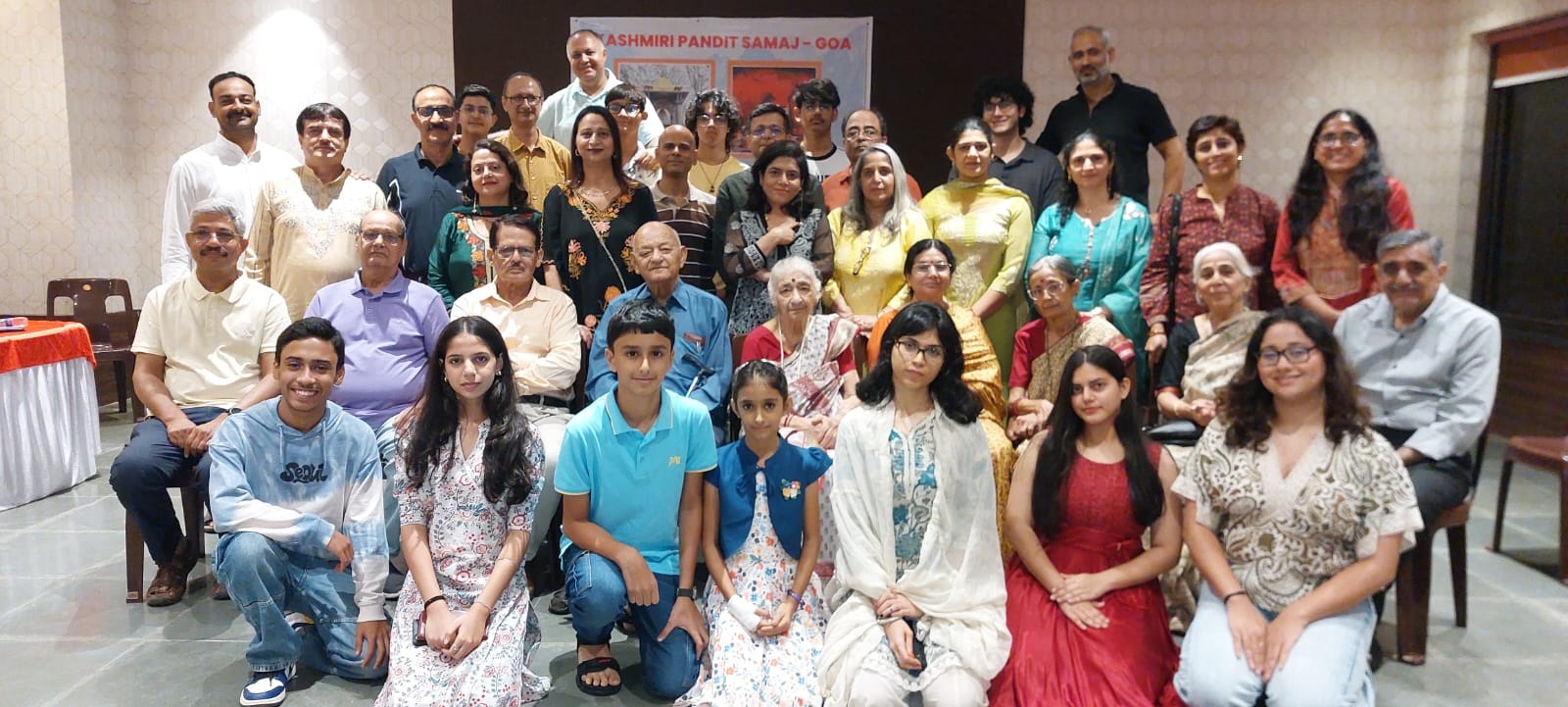
It was a special gathering at Panaji Gymkhana on June 15 that brought together over two dozen families of Kashmiri Pandits who have made Goa their new home. Organised under the banner of Kashmiri Pandit Samaj – Goa, it was a day of sharing stories, laughter, music, and traditional food.
These families, well-educated and experienced, are contributing to Goa’s economy and culture in various ways. Some are in jobs, others run businesses, some have served in government roles, and a few are now retired. Listening to each other’s journeys stirred emotions and reinforced a shared desire—to stay connected to their roots while embracing life in Goa.
They spoke about how and why they came to Goa. Some arrived five years ago, others over four decades ago. A few were born in Goa, and their children now feel more Goan than Kashmiri.
“When culture binds us, emotions flow. That’s exactly what we witnessed at the KPS Goa gathering. Three generations of Kashmiri Pandits—around 40 people—came together and celebrated their roots,” said Prof Meena Sahib Parulekar, a healthcare academic and professional.
Prof Meena teaches healthcare management at Goa Institute of Management (GIM), Sankhali, and also works in the tech space to support the healthcare sector. With qualifications in pharmacy, business administration, and a PhD in healthcare behaviour, she was born in Goa to a Kashmiri family and is married to Ajit Parulekar, the director of GIM.
The event saw people from varied backgrounds and age groups come together, bonding over shared memories and delicious Kashmiri dishes.
“Kashmiris are Saraswat Brahmins. Most Saraswat Brahmins in Goa have ancestral roots in Kashmir,” said Mohiet Hastwala, who has lived in Goa with his family since 2013. A business owner, financial consultant and coach, he spoke about his personal journey to rediscover his identity.
“For years, I felt like a traveller unsure of where I belonged. But now, I feel a sense of relief. I’ve found my people. It’s like finding a missing part of your soul,” said Hastwala.
Prof Meena echoed this. “Our experiences as Kashmiri Hindus show that culture is the foundation of civilisation. Going back to our roots is the best way to honour that,” she said, adding that the event highlighted cultural similarities between Goa and Kashmir.
“It’s a blessing to reconnect with our Saraswat roots. We are all made of the same thread, only separated by time and distance,” she said. KPS Goa, she explained, is about preserving Kashmir’s heritage and passing it on to the next generation.
Pawan Koul, Vice-President at IFB Industries and an engineering graduate from NIT Srinagar, said Kashmiri Pandits are the latest among Saraswat Brahmins to face ethnic cleansing. Around half a million have been displaced, with 20–30 families settling in Goa.
These families contribute to Goa in many fields—urban planning, medicine, education, the military and corporate management. From R K Pandita, Goa’s Chief Town Planner, to professors like Gaurav Dhar at BITS Pilani Goa Campus, several Kashmiris have made Goa their Karm Bhoomi. They are thankful to locals for welcoming them with respect and friendship.
The gathering wasn’t just social—it was about reconnecting with a culture that distance and time had blurred. The Kashmiri Pandits in Goa have roots in Anantnag, Baramulla, Srinagar and other parts of Kashmir. All of them were forced to leave their homes. But as followers of Maa Sharada (Saraswati), they chose education over violence. Despite hardships, they ensured their children were educated and became role models.
“Even after being displaced, not a single person became a criminal or picked up a stone or gun. That reflects our true culture—resilience with dignity,” said Koul.
Some have not returned to Kashmir for over three decades. Others left a century ago and never went back. “While we have contributed to India and Goa, our Kashmiri (Saraswat) identity is fading. To preserve it, we need to live together and pass our values on. That’s why we formed KPS Goa,” added Koul.
The group is now appealing to the Goa government to allot land where the community can live together and celebrate their festivals. Such a move would help connect Goa with the global Kashmiri Pandit community, who are well-settled across the world—from the US and Europe to Singapore and Russia.
Kashmiri Pandit Samaj (Goa) may be a small start, but it is a powerful one. More Kashmiri families in Goa may join in the future.
“This gathering filled my heart with hope,” said Hastwala. “Reconnecting with my Kashmiri identity is no longer just my journey—it’s a movement of hearts coming together. No matter where we live, our roots run deep. When we stand together, we bloom again.”